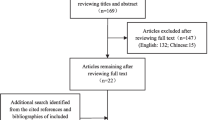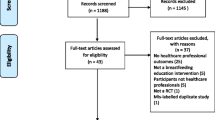Abstract
Background
Breastfeeding rates in Ireland are among the lowest in the world; thus, it is important to understand what knowledge and skills exist and what are the education needs of dietitians. There has been no Irish research on dietitians’ perception of their role in promoting, protecting and supporting breastfeeding.
Aims
The aim of this study was to explore the breastfeeding-related education that dietitians participated in, their breastfeeding-related skills, knowledge and attitudes towards breastfeeding.
Methods
An e-survey was conducted among members of the Irish Nutrition and Dietetic Institute.
Results
Fifty-nine percent of the 181 respondents received education or training on breastfeeding since qualifying with a trend of more training time on general breastfeeding knowledge and less time on clinical issues. There were lower confidence in skills, and role expectations related to clinical practice and clinical skills were perceived as required by only a few dietitians in specific roles. Personal breastfeeding experience was associated with greater confidence in their breastfeeding-related skills and a greater likiehood of reporting positive attitudes. The main source of information about breastfeeding was own reading or experience. Most respondents (64%) felt that their practice would benefit from additional training. The most frequently reported barriers to providing breastfeeding-related care were “I lack the skill”, “I lack the confidence”, and “I lack the knowledge to provide assistance with breastfeeding”.
Conclusions
Further examination of the role of the dietitian and the establishment of expected competencies would provide a clear framework for future training and education of dietitians towards increasing breastfeeding prevalence in Ireland.

Similar content being viewed by others
Notes
Available on request from authors
See Supplementary Materials for table of results of subgroup analysis.
See Supplementary Materials for table of results of subgroup analysis.
See Supplementary Materials for table of results of subgroup analysis.
Personal communication, INDI office
Abbreviations
- CPD:
-
Continuing professional development
- HSE:
-
Health service executive, which is responsible for the provision of health and personal social services with public funds
- IBCLC:
-
International Board Certified Lactation Consultant
- INDI:
-
Irish Nutrition and Dietetic Institute, the national organisation in Ireland for dietetic professionals
References
Healthcare Pricing Office HSE (2018) Perinatal Statistics Report 2016. Dublin, Ireland. http://www.hpo.ie/latest_hipe_nprs_reports/NPRS_2016/Perinatal_Statistics_Report_2016.pdf. Accessed 29 Sept 2020
National Breastfeeding Implementation Group (2017) Breastfeeding in a Healthy Ireland HSE Action Plan 2016-2021 Update Report 2017. Health Service Executive, Ireland. http://ichn.ie/wp-content/uploads/Annual-Report-Breastfeeding-in-a-Healthy-Ireland-HSE-Action-Plan-2016-2021-Update-for-2017.pdf. Accessed 29 Sept 2020
Health Service Executive (2016) Breastfeeding in a Healthy Ireland - Health Service Breastfeeding Action Plan 2016 – 2021. Dublin, Ireland https://www.breastfeeding.ie/Uploads/breastfeeding-in-a-healthy-ireland.pdf. Accessed 29 Sept 2020
World Health Organization and UNICEF (1989) Protecting, promoting and supporting breast-feeding : the special role of maternity services / a joint WHO/UNICEF statement. World Health Organization, Geneva https://apps.who.int/iris/handle/10665/39679. Accessed 29 Sept 2020
World Health Organization and UNICEF (2009) Baby-Friendly Hospital Initiative: revised, updated and expanded for integrated care. Geneva. http://apps.who.int/iris/handle/10665/43593. Accessed 29 Sept 2020
Lessen R, Kavanagh K (2015) Practice paper of the Academy of Nutrition and Dietetics: promoting and supporting breastfeeding. J Acad Nutr Diet 115(3):450. https://doi.org/10.1016/j.jand.2014.12.015
Lessen R, Kavanagh K (2015) Position of the Academy of Nutrition and Dietetics: promoting and supporting breastfeeding. J Acad Nutr Diet 115(3):444–449. https://doi.org/10.1016/j.jand.2014.12.014
British Dietetic Association (2018) Breastfeeding policy statement. https://www.bda.uk.com/resource/breastfeeding-policy-statement.html. Accessed Sept 29 2020
Helm A, Windham CT, Wyse B (1997) Dietitians in breastfeeding management: an untapped resource in the hospital. J Hum Lact 13(3):221–225. https://doi.org/10.1177/089033449701300311
Payne J, Radcliffe B, Blank E, Churchill E, Hassan N, Cox E, Porteous H (2007) Breastfeeding: the neglected guideline for future dietitian-nutritionists? Nutr Diet 64(2):93–98. https://doi.org/10.1111/j.1747-0080.2007.00094.x
Bagwell JE, Kendrick OW, Stitt KR, Leeper JD (1993) Knowledge and attitudes toward breast-feeding: Differences among dietitians, nurses, and physicians working with WIC clients. J Am Diet Assoc 93(7):801–806. https://doi.org/10.1016/0002-8223(93)91756-G
Daneault S, Beaudry M, Godin G (2004) Psychosocial determinants of the intention of nurses and dietitians to recommend breasfeeding. Can J Public Health 95:151–154 https://www.jstor.org/stable/41994119. Accessed 29 Sept 2020
National Nutrition Surveillance Centre (2010) Assessment of training needs of health care professionals who provide foetal, maternal and infant nutrition advice. National Nutrition Surveillance Centre as part of the HSE Framework for action on obesity, University College Dublin. http://www.ucd.ie/nnsc/t4media/Assessmentoftrainingneedsofhealthcareprofessionalswhoprovidefoetal,maternalandinfantnutritionadvice.pdf. Accessed 29 Sept 2020
Becker GE (1992) Breastfeeding knowledge of hospital staff in rural maternity units in Ireland. J Hum Lact 8(3):137–142
Ryan M, Smith J (2016) Breastfeeding knowledge, attitudes and training of pharmacists. Breastfeed Rev 24(2):35–43
Wallace L, Kosmala-Anderson J (2006) A training needs survey of doctors’ breastfeeding support skills in England. Matern Child Nutr 2:217–231. https://doi.org/10.1111/j.1740-8709.2006.00070.x
Wallace L, Kosmala-Anderson J (2007) Training needs survey of midwives, health visitors and voluntary-sector breastfeeding support staff in England. Matern Child Nutr 3:25–39. https://doi.org/10.1111/j.1740-8709.2007.00079.x
Hoddinott P, Craig L, Britten J, McInnes R (2010) A prospective study exploring the early infant feeding experiences of parents and their significant others during the first 6 months of life: what would make a difference? Edinburgh, NHS Health Scotland http://www.healthscotland.com/documents/4720.aspx. Accessed 29 Sept 2020
World Health Organization International Code of Marketing of Breast-milk Substitutes and subsequent resolutions. https://www.who.int/nutrition/netcode/resolutions/en/. Accessed 29 Sept 2020
UNICEF UK (2019) Baby Friendly Initiative learning outcomes for dietetic students. London https://www.unicef.org.uk/babyfriendly/accreditation/universities/learning-outcomes/learning-outcomes-dietetic-students/. Accessed 29 Sept 2020
Whelan B, Kearney J (2014) Breast-feeding support in Ireland: a qualitative study of health-care professionals' and women's views. Public Health Nutr 18(12):1–9. https://doi.org/10.1017/S1368980014002626
Andreas NJ, Kampmann B, Mehring Le-Doare K (2015) Human breast milk: a review on its composition and bioactivity. Early Hum Dev 91(11):629–635. https://doi.org/10.1016/j.earlhumdev.2015.08.013
Hauck Y, Blixt I, Hildingsson I, Gallagher L, Rubertsson C, Thomson B, Lewis L (2016) Australian, Irish and Swedish women’s perceptions of what assisted them to breastfeed for six months: exploratory design using critical incident technique. BMC Public Health 16(1):1. https://doi.org/10.1186/s12889-016-3740-3
Acknowledgements
The authors would like to acknowledge the dietitians who assisted in the piloting of the questions and the respondents in the survey and assistance of the INDI in disseminating the survey.
Author information
Authors and Affiliations
Corresponding author
Ethics declarations
Conflict of interests
The authors declare that they have no conflict of interests.
Additional information
Publisher’s note
Springer Nature remains neutral with regard to jurisdictional claims in published maps and institutional affiliations.
Electronic supplementary material
ESM 1
(PDF 325 kb)
Rights and permissions
About this article
Cite this article
Becker, G.E., Quinlan, G., Ward, F. et al. Dietitians supporting breastfeeding: a survey of education, skills, knowledge and attitudes. Ir J Med Sci 190, 711–722 (2021). https://doi.org/10.1007/s11845-020-02384-3
Received:
Accepted:
Published:
Issue Date:
DOI: https://doi.org/10.1007/s11845-020-02384-3




